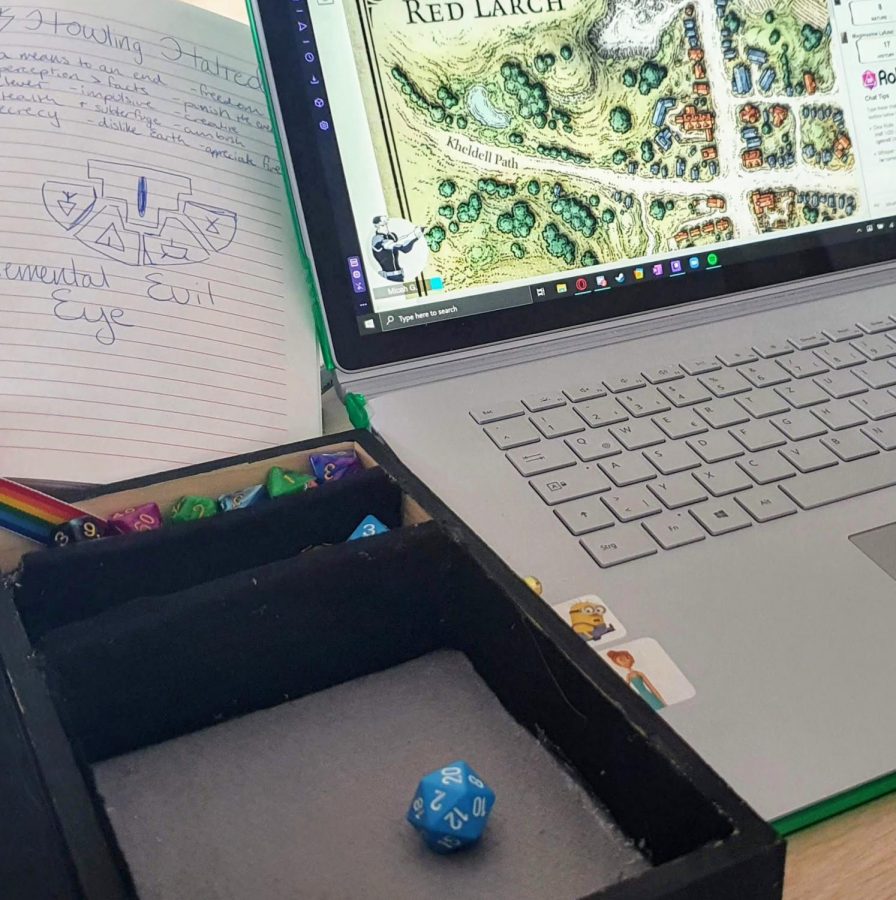Keep the Dice Rolling
How Dungeons and Dragons Flourishes In Quarantine
It’s a few hours past when I normally go to bed, but I’m still sitting up, awake, at my computer. “Alright, Thotham. I need you to make a death saving roll,” I demand. I’m currently on a Discord call with fellow Dungeons and Dragons enthusiasts across Europe, all brought together by the love of roleplaying. Thotham’s player rolls a twenty-sided die and happily reports that he has successfully rolled a death save. His ally is able to revive him on the next turn, and he is able to rejoin the fight to finish off the boss.
With shows such as Community, The Big Bang Theory, and Stranger Things featuring the original version of Dungeons and Dragons, it’s no surprise that more and more people are trying to figure out what the game is all about. Dungeons and Dragons, also known as D&D, is one of many tabletop roleplaying games which looks to provide an experience much like that of a fantasy video game. D&D integrates aspects of political intrigue, dungeon crawling, monster slaying, roleplaying, and silly small moments to create a memorable experience for players of all ages.
Typically, the players will talk with the dungeon master (DM), also known as the game master, to discuss the type of game they’d like to play. Some players would like a kingdom management game while others would prefer to brawl their way through dungeons or engage in the politics of the local city. Once these aspects are discussed with the DM, the players all create characters by selecting a fantasy species for the character (such as elves, dwarves, tieflings, and more!) and an archetype, known as a class, for that character, such as a fighter, a warlock, or a paladin. Meanwhile, the DM prepares dungeons, towns, and interactions for the players to interact with. When the game begins, the DM will describe the world to the players, and it is up to each of the players to make decisions about what to do. More often than not, the outcome of these decisions is decided by rolling a variety of polyhedral dice, especially the twenty-sided one.
While the rules are certainly more complex than this (after all, the Player’s Handbook is over 300 pages), a game which offers an experience tailored to the players is a worthy trade off for many people. By offering people a chance to escape their day to day life through roleplaying another person partaking in exciting adventures, D&D is a powerful creative outlet for those wishing to escape their day-to-day life. When the world went into lockdown to stop the COVID-19 pandemic, it was more important than ever to find an outlet in a time of social distancing and quarantines. Luckily for D&D players, there were already plenty of digital resources available to the D&D community.
Many groups were already playing on virtual tabletops such as Roll20 or Foundry and had online compendiums such as D&D Beyond or Roll20’s built-in compendium. Discord servers dedicated to D&D already had bots they could use to roll dice and link their characters to their party members. When the world went into lockdown, even more players would rely on these digital sources to continue their games even though they couldn’t meet up. With this plethora of digital resources, newcomers had a larger opportunity to engage with the game.
Whereas in the past playing D&D may have been simply an afterthought — perhaps something they would do if they had time — thanks to the lockdown, some of these people were able to make this dream a reality. With the large amount of resources already available online, teaching these people how to play with introductory games in online computers was relatively easy, especially when they joined forces with experienced players or DMs. However, even new groups could start up as they all learned together.
Even if people weren’t able to find a group to play in, they had plenty of time to explore the campaigns other groups have run. Shows such as Critical Role, High Rollers, and The Adventure Zone got more attention as viewers now had more time available to listen in or watch the campaigns. For many D&D content creators, quarantine has provided an opportunity for their viewerships to grow and to introduce more people to the game.
As the number of people involved in D&D increases the rules and ideas which influence the game are also changing. Numerous supplemental books with titles such as Volo’s Guide to Monsters and the more recent Tasha’s Cauldron of Everything provide new optional rules which players can play with. On top of that, many groups develop house rules to make the game easier, harder, more realistic, or more fun. However, the current set of official rules are a far cry from the original rules (luckily, they are much easier to read!).
The first set of rules were originally written in 1974 by Gary Gygax, however the ruleset evolved as demand for the game continued to grow. Eventually the rules would be revised, as would companion books, dividing the rules and their supplements into editions of the game. In 2014, the latest edition of the rules were published, constituting the 5th Edition (A more in depth history of Dungeons and Dragons can be found here).
When quarantine began, I looked for a fifth edition group I could play some D&D with. In the past, I had always been the DM and never had the opportunity to play the game and enjoy it. After a lot of searching, I stumbled upon a Discord server with hundreds of English-speaking D&D players based in Europe. With them, I was able to embark on my first games as a player and remember what I loved about fantasy games — a chance to escape my day to day life and remember, even if it’s just for a few hours, that I can live a life that’s anything but ordinary.






